Class definition
See Programs of Type
Class.
Resource definition
See Programs of Type
Resource.
Database function options
See Programs of Type
Database function.
Procedure options
See Programs of
Type SQL Procedure.
Entry points
Entry points are to be modified. This is valid only for programs
written in certain languages. See
Overview of
Language-Specific Program Types.
The following rules apply:
Only those types of additional attributes appear in the window that apply to the type of program. For example: the option Class definition is not contained in the list when a program of type Resource is processed.
More than one choice can be made at a time. The respective input maps are then displayed one after the other.
This document covers the following topics:
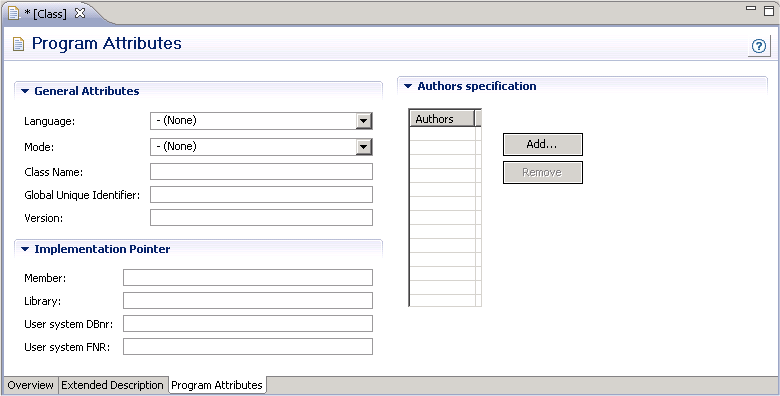
| Parameters | |
|---|---|
| Class Name | The name of the class. |
| Global Unique Identifier | The globally unique ID of the class. |
| Version | The version number of the class. |
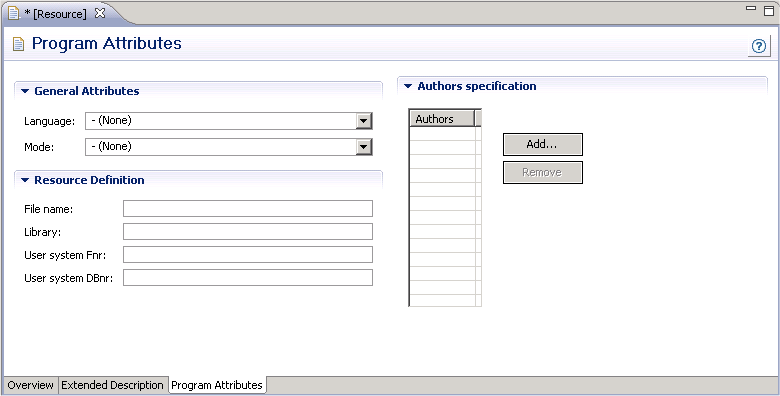
| Parameters | |
|---|---|
| File name | File name documented by the Predict program. |
| Library | The name of the library in which the file name is stored. |
| User System Fnr | The number of the user system file. |
| User System DBnr | The number of the database in which the user system file is located. |
The type of Resource can be documented in the language field of a Predict program object. There is a user exit program U-PGMLAN that allows dynamic extension of possible languages in each installation.
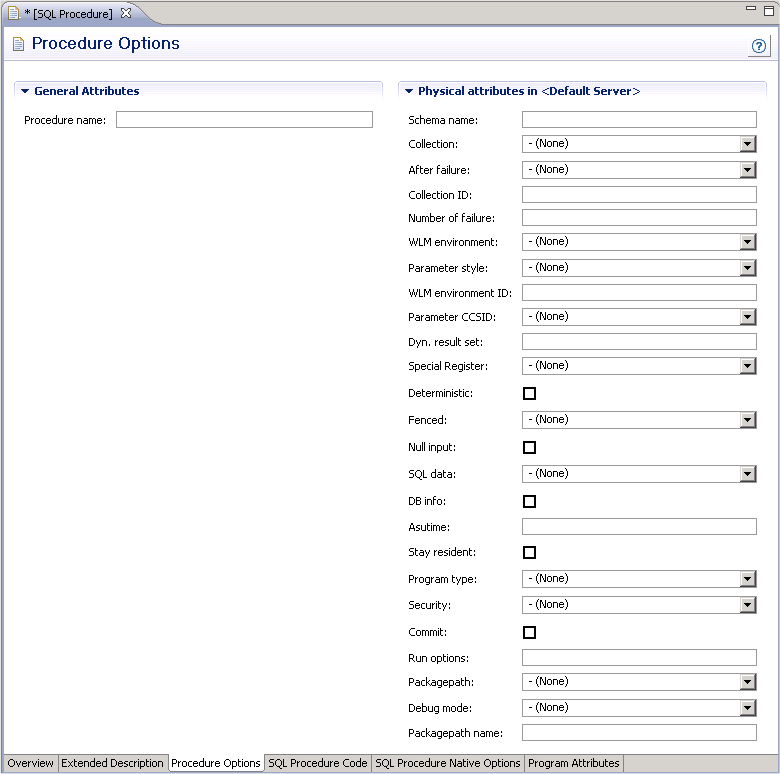
| Parameters | |||||||||||||
|---|---|---|---|---|---|---|---|---|---|---|---|---|---|
| Procedure name | This name must comply with SQL naming conventions. See the section Naming Conventions for SQL Objects in the section Adabas D and Other SQL Systems in the Predict and Other Systems documentation. | ||||||||||||
| Schema name | Used as a qualifier for an unqualified procedure name. | ||||||||||||
| Specific name | Specifies a unique name for the procedure. | ||||||||||||
| Collection |
|
||||||||||||
| WLM environment | Identifies the MVS workload manager application environment. | ||||||||||||
| Dyn. result set | Specifies the maximum number of query result sets that the stored procedure can run. | ||||||||||||
| Deterministic |
|
||||||||||||
| Null input |
|
||||||||||||
| DB info |
|
||||||||||||
| Stay resident | Specifies whether the load module for the procedure remains resident in memory when the procedure ends. | ||||||||||||
| Security |
|
||||||||||||
| After failure |
|
||||||||||||
| Run options | Specifies the language environment run-time options to be used for the procedure. | ||||||||||||
| Packagepath |
|
||||||||||||
| Parameter style |
|
||||||||||||
| Parameter CCSID |
|
||||||||||||
| Special Register |
|
||||||||||||
| Fenced |
|
||||||||||||
| SQL data |
|
||||||||||||
| Asutime | Specifies the total amount of processor time. | ||||||||||||
| Program type |
|
||||||||||||
| Commit |
|
||||||||||||
| Debug Mode |
|
||||||||||||
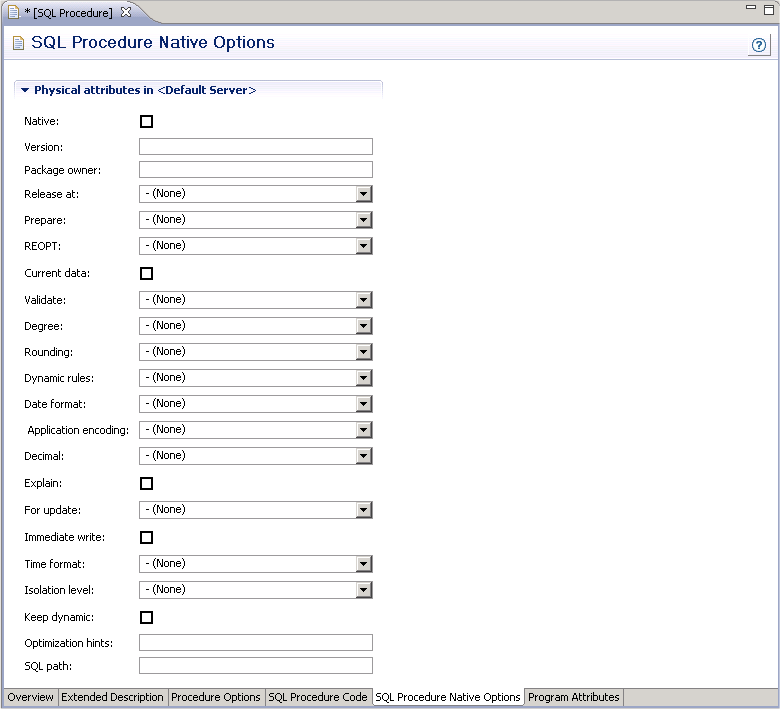
Valid values are:
| Parameters | |||||||||||||||||||
|---|---|---|---|---|---|---|---|---|---|---|---|---|---|---|---|---|---|---|---|
| Native |
|
||||||||||||||||||
| Version | Specifies the procedure version identifier. The default is V1. | ||||||||||||||||||
| Package owner | Specifies the owner of the package. | ||||||||||||||||||
| Prepare |
|
||||||||||||||||||
| Current data |
|
||||||||||||||||||
| Degree |
|
||||||||||||||||||
| Dynamic rules |
|
||||||||||||||||||
| Appl. encoding |
|
||||||||||||||||||
| Explain |
|
||||||||||||||||||
| Immediate write |
|
||||||||||||||||||
| Isolation level |
|
||||||||||||||||||
| Keep dynamic |
|
||||||||||||||||||
| Optimization hints | Specifies query optimization hints. | ||||||||||||||||||
| SQL path | Specifies the SQL path. | ||||||||||||||||||
| Release at |
|
||||||||||||||||||
| REOPT |
|
||||||||||||||||||
| Validate |
|
||||||||||||||||||
| Rounding |
|
||||||||||||||||||
| Date format |
|
||||||||||||||||||
| Decimal |
|
||||||||||||||||||
| For update |
|
||||||||||||||||||
| Time format |
|
||||||||||||||||||
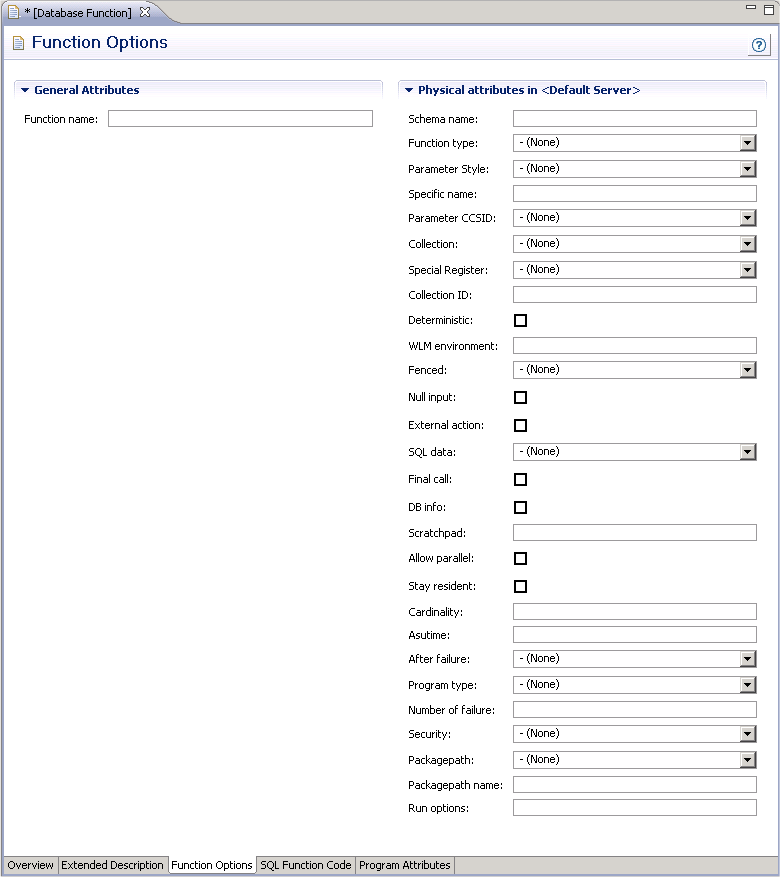
| Parameters | |||||||||||||
|---|---|---|---|---|---|---|---|---|---|---|---|---|---|
| Function name | This name must comply with SQL naming conventions. See the section Naming Conventions for SQL Objects in the section Adabas D and Other SQL Systems in the Predict and Other Systems documentation. | ||||||||||||
| Function type |
|
||||||||||||
| Schema name | Used as qualifier for an unqualified function name. | ||||||||||||
| Specific name | Specifies an unique name for the function. | ||||||||||||
| Collection |
|
||||||||||||
| WLM environment | Identifies the MVS workload manager application environment. | ||||||||||||
| Special Register |
|
||||||||||||
| Deterministic |
|
||||||||||||
| Null input |
|
||||||||||||
| External action |
|
||||||||||||
| Final call |
|
||||||||||||
| DB info |
|
||||||||||||
| Asutime | Specifies the total amount of processor time. | ||||||||||||
| Program type |
|
||||||||||||
| Run options | Specifies the language environment run-time options to be used for the function. | ||||||||||||
| Packagepath |
|
||||||||||||
| After failure |
|
||||||||||||
| Parameter Style |
|
||||||||||||
| Parameter CCSID |
|
||||||||||||
| Fenced |
|
||||||||||||
| SQL data |
|
||||||||||||
| Scratchpad | Specifies whether DB2 provides a scratchpad for the function. | ||||||||||||
| Allow parallel |
|
||||||||||||
| Cardinality | Specifies an estimate of the expected number of rows that the function returns. | ||||||||||||
| Stay resident | Specifies whether the load module for the function remains resident in memory when the function ends. | ||||||||||||
| Security |
|
||||||||||||
Programs that are only available as object code and hence have no language are documented with programs of type E (external object) and language Z (system program). Predict creates XRef data for these so called system programs because neither the preprocessor nor Natural can create XRef data for object code.
The implementation pointer for a system program has to be specified explicitly. One entry point (with the ID of the program object) is created by Predict, additional entry points have to be specified manually.
Programs of type dynamic are used to document calls of programs of the same name from different steplibs depending on the library structure. The following rules apply:
Because programs of type dynamic document any number of implemented members, no check is performed as to whether the members documented by the program are actually implemented.
With the active retrieval function Programs using programs, programs of type dynamic are ignored as current objects.
Programs of this type can only have children for association "Uses PR concept".